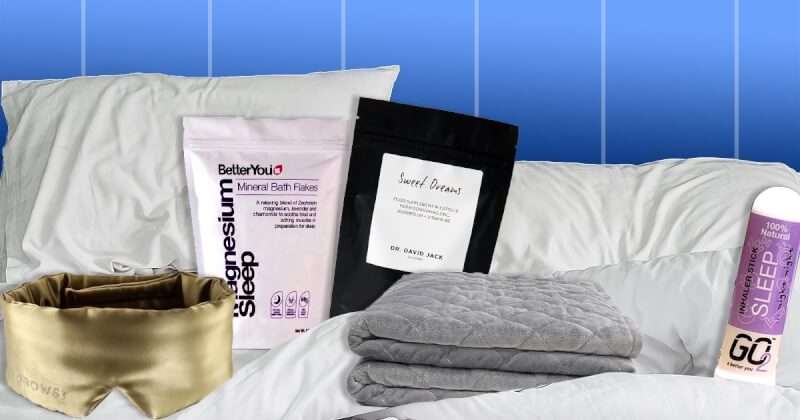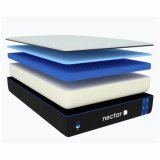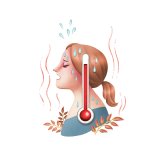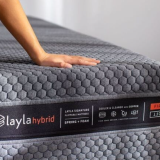Anxiety can take a toll on your ability to sleep well. People who suffer from anxiety often find it difficult to fall asleep or stay asleep throughout the night, leading to a constant feeling of tiredness and fatigue during the day. Thankfully, there are several sleep aids available that can help alleviate anxiety symptoms and promote better quality sleep.

Understanding Anxiety and Sleep
Before we dive into the best sleep aids for anxiety, it’s important to understand how anxiety affects our sleep patterns. Anxiety is known to increase levels of cortisol in our bodies, which can make getting restful sleep even more difficult. On average, 40 million US adults have an anxiety disorder affecting their daily lives; many of these individuals also suffer from some form of insomnia. Poorly managed changes in lifestyle habits caused by anxious thoughts, in turn, may not give enough time for adequate nighttime sleeping behaviors, causing a further decline in health[1].
Top Sleep Aids for Anxiety
Here are some sleep aids that may help people struggling with anxiety:
- Weighted blankets: These blankets provide gentle pressure on the body, similar to a hug, and can help promote relaxation and improve sleep quality. Studies have shown that weighted blankets can help reduce anxiety and insomnia.
- White noise machines: White noise machines create a consistent, soothing background noise that can help block out external sounds and make it easier to fall asleep. For more information on sleep aids, check out these best king size mattresses.
- Meditation and relaxation techniques: Practicing meditation or deep breathing exercises before bed can help calm the mind and promote relaxation, making it easier to fall asleep. Give these expert tips for spinal health a try for more relaxation techniques.
- Aromatherapy: Essential oils like lavender, chamomile, and valerian have been shown to promote relaxation and improve sleep quality. Use a diffuser or apply the oils directly to your pillow for the best results.
- Herbal supplements: Natural supplements like valerian root, melatonin, and passionflower can help promote relaxation and improve sleep quality. Always consult with a healthcare professional before using any supplements, especially if you are taking prescription medications.
Making Your Sleep Environment More Comfortable
In addition to using sleep aids, it’s essential to create a comfortable sleep environment. Invest in a high-quality mattress that provides the right support and comfort for your body type and sleeping position. Additionally, consider using sheets and bedding made from natural, breathable materials like cotton or bamboo to keep you cool and comfortable throughout the night. For more tips on creating a comfortable sleep environment, check out this guide on how to choose a mattress for couples with different sleep preferences.
Types of Sleep Aids
There are numerous types of sleep aids available ranging from prescription medications such as benzodiazepines, hypnotics & sedatives used mainly for short-term relief; antihistamines that may cause cognitive side effects including potential dependence when overused ; natural supplements made primarily up nutrients found naturally occurring within plants like L-Theanine or Cannabidiol Oil amongst other options focused around relaxation techniques. For more information on natural sleep aids, check out these top mattresses for insomnia relief.
Sleep and Mental Health
Sleep and mental health are deeply interconnected. A lack of quality sleep can exacerbate mental health conditions such as anxiety and depression, while these conditions can, in turn, lead to sleep disturbances. Understanding this relationship can help individuals with mental health conditions improve their sleep and overall wellbeing.
For instance, insomnia is a common symptom of both anxiety and depression. It’s a vicious cycle: anxiety can make it difficult to fall asleep, and lack of sleep can increase anxiety levels. Similarly, depression can lead to hypersomnia (excessive sleep) or insomnia, and these sleep disturbances can worsen depressive symptoms.
To break this cycle, it’s crucial to adopt strategies for improving sleep. These could include maintaining a regular sleep schedule, creating a restful sleep environment, and practicing relaxation techniques before bed. Cognitive-behavioral therapy for insomnia (CBT-I) can also be beneficial.
Sleep Technology
The rise of sleep technology has provided new tools for understanding and improving sleep. From sleep tracking apps to smart mattresses, these technologies can provide insights into sleep patterns and help individuals make changes to improve their sleep quality.
For example, sleep tracking apps can monitor sleep stages and wake-up times, providing data that can be used to adjust sleep schedules or habits. Smart mattresses can adjust firmness levels based on sleep position, potentially improving comfort and reducing sleep disturbances.
However, it’s important to approach sleep technology with a critical eye. Not all products are equally effective, and it’s essential to consider factors such as accuracy, ease of use, and privacy when choosing a sleep technology product.
Sleep and Diet
Diet plays a significant role in sleep quality. Certain foods and drinks can promote sleep, while others can disrupt it. Understanding the relationship between diet and sleep can help individuals make dietary choices that support good sleep.
For example, foods high in tryptophan (an amino acid that helps produce sleep-promoting serotonin) can aid sleep. These include turkey, nuts, and seeds. Conversely, caffeine and alcohol can disrupt sleep and should be consumed in moderation, especially close to bedtime.
Hydration also plays a role in sleep quality. Dehydration can lead to dry mouth and throat, potentially causing discomfort and wakefulness during the night. Drinking plenty of water throughout the day (but not too much close to bedtime) can help maintain hydration levels and promote good sleep.
Sleep Environment
The sleep environment can significantly impact sleep quality. Factors such as temperature, light, and noise can either aid or disrupt sleep. By optimizing these factors, individuals can create a sleep-friendly bedroom that promotes restful sleep.
For instance, research suggests that a slightly cool room temperature can aid sleep. Light and noise can disrupt sleep, so consider using blackout curtains and white noise machines if necessary. The quality of your mattress and bedding can also impact sleep, so choose these items with care.
Sleep and Lifestyle
Lifestyle factors can significantly impact sleep. Exercise, work schedules, and stress levels can all affect sleep quality and quantity. By understanding these relationships, individuals can make lifestyle changes that improve their sleep.
For example, regular exercise can promote good sleep by helping regulate circadian rhythms and reduce anxiety. However, it’s best to avoid vigorous exercise close to bedtime as it can be stimulating. Work schedules, particularly shift work, can disrupt circadian rhythms and lead to sleep disturbances. If possible, try to maintain a consistent sleep schedule, even on days off.
Stress and relaxation also play a role in sleep. High stress levels can lead to insomnia, while relaxation techniques such as yoga and meditation can promote good sleep. Incorporating relaxation techniques into your bedtime routine can help prepare your mind and body for sleep.
Conclusion
Sleep aids can go a long way in helping alleviate anxiety symptoms and promoting better quality sleep. It is important that you speak with qualified healthcare providers beforehand incorporating anything into your routine & lifestyle. Often changes in lifestyle habits such as proper sleeping positions, diet & exercise can also enhance the effectiveness of any sleep aid chosen for you. For more information on sleep aids, check out these top natural sleep remedies for children.
FAQs
Some of the top sleep aids for anxiety include melatonin supplements, chamomile tea, lavender essential oils, and valerian root extract. A healthcare professional might also advise taking prescription medications like benzodiazepines and antidepressants.
It is not recommended to rely on sleep aids for extended periods of time as they can become habit-forming and may lead to dependence. It is important to speak with a doctor before taking any sleep aid regularly.
It is crucial to speak with a healthcare professional before using any natural or over-the-counter remedies while also taking prescribed medication. Some combinations could potentially cause adverse reactions or interactions that could be harmful to your health.











